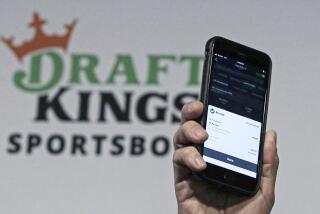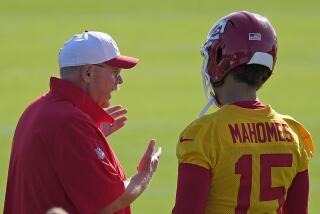It Might Be Last Roundup for NFL : Pro football: Odds are a federal court will call the college draft an antitrust violation, but there appears to be negotiating room with the players.
- Share via
Is this the last draft?
Is the NFL on the verge of major operational changes?
Or are the league’s 28 club owners about to yield on free agency in exchange for the endorsement of their 1,500 players on a draft extension?
All that has been a subject for angry debate in pro football this month, leading up to the 57th annual selection of college players next Sunday and Monday at 28 NFL sites.
This is the last draft that will have the formal blessing of the NFL’s players--a sanction the owners need, ostensibly, to avoid an antitrust action.
Or do they?
“I’m with the commissioner,” Philadelphia Eagle owner Norman Braman said the other day, referring to Paul Tagliabue’s public position that a 1993 draft will be held without player approval, if necessary.
But Gene Upshaw, executive director of the NFL Players Assn., said from Washington: “If the owners make a unilateral decision to draft anybody, that’s a clear violation of antitrust (law).”
Braman, an NFL leader, replied from his Miami office: “I’m confident we’ll have a 1993 draft that will meet the (courts’) test of reasonableness.”
Among those agreeing are Jerry Jones, owner of the Dallas Cowboys, and John Shaw, executive vice president of the Rams.
“My quote to you is (Tagliabue’s),” Shaw said. “A (1993) draft will be approved. Our legal counsel is sure that some form of the draft will be (sustained) against any legal challenge.”
Two changes in the present form are under consideration, others said: a reduction in the number of draft rounds--currently 12--and a scheme to allow more than one club to bid for early round players.
“The fewer rounds, the fewer players drafted, the less offensive it is to the courts,” one club source said.
Said Braman: “We can survive fewer rounds.”
Jones, agreeing, said: “But I’m comfortable that we’ll have something akin to what we have now. We’re approaching next week’s draft as if it isn’t the last one. We might approach it differently if we thought it would be the last.”
Players’ lawyers, in preliminary negotiations with owners’ lawyers this year, haven’t made a big issue of the draft. It isn’t a high-priority item to professional athletes, who are long out of college.
Nonetheless, it’s very much a players’ bargaining chip--their big one--in the same sense that player free agency is the owners’ principal bargaining chip.
On both sides, the chips are carefully guarded.
THE DEBATE
Leigh Steinberg, a players’ attorney-agent in Newport Beach, is among those who consider that a chip-swapping agreement is all that can save the draft.
Otherwise, he said: “The draft is extinct. There’s no chance the players will lose on this issue in court. If you make a VCR of next week’s draft, save it. It’s the last draft you’ll ever see in this form.
“This is a country predicated on a free economic system and a free choice of job opportunities. In every other area of the American economy, businesses have to compete for young talent. The NFL draft is so antithetical to the values of the American system that no court would uphold it.
“So the draft is gone--without the consent of the players. And even then, it’s a question whether NFL veterans can set the rules for college boys.”
All the same, there are a lot of good things about the draft in exactly its present form, Jones said from Dallas.
“To begin with, everybody in (the NFL) is well paid,” he said. “I don’t see how anybody could argue that the draft is a hardship to anyone.
“As for the new players, there’s a lot of money in it for them. I have a very strong feeling that the draft isn’t unfair to anyone.”
As a process, however, its future is plainly in doubt. And on both sides, all parties acknowledge that if next week’s renewal isn’t the end of the line, one of two things must happen:
--The players, who haven’t signed a collective bargaining agreement with the owners in 10 years, will have to approve a new one authorizing an extension.
--Or a federal judge will have to allow it, conceivably this summer with an anti-NFLPA ruling in the Freeman McNeil case, which goes to trial June 15 in Minneapolis.
In that action, former UCLA running back McNeil and seven other NFL players are seeking free agency in a suit based on two federal court decisions upholding two key NFLPA positions disputed by the owners.
Courts today, however, prefer settlements to trials. And a Pittsburgh attorney-agent, Ralph Cindrich, is among those expecting peace by June.
Cindrich, who sponsored last year’s pioneering Cindrich survey of college players’ pre-draft needs and attitudes, calls McNeil a 10-1 trial favorite because of the “obvious antitrust vulnerability” of the NFL.
“That would probably bring, in addition to free agency, the abolition of the draft--and the owners can’t afford to take such a chance,” Cindrich, a former NFL linebacker, said during a visit to San Diego. “But say there’s only a 10% chance that the players will lose--I don’t think they can afford the risk, either. A loss would be devastating to the (NFLPA).”
Neither side seems that worried.
“I’m comfortable with the risks involved,” Dallas owner Jones said.
Said NFLPA assistant executive director Doug Allen: “This is just one of the free-agent suits that have been, or will be, filed.”
Yes, but it’s the key case. And the judge who has it, David L. Doty of Minneapolis, is the one who has had jurisdiction throughout the longest and most significant player-owner confrontation in 20 years.
“The McNeil case is the ballgame,” an NFL spokesman said.
THE PROBLEM
Suppose that instead of the draft next year, there is free agency. Would the NFL survive? Why do the pros need to draft college players.
“It’s essential to maintain competitive balance,” said New York Giant owner Wellington Mara, noting that good college players would be less likely to sign with Buffalo or Green Bay if they weren’t drafted.
Upshaw does not agree.
“For the last three years, Plan B free agents have chosen Green Bay or Cleveland as often as they’ve gone to L.A. or New York,” he said.
In Steinberg’s opinion, it’s a myth that the NFL’s draft system creates competitive balance.
“You have Indianapolis and Tampa Bay drafting at the top every year,” he said. “You have the (San Francisco) 49ers, Raiders and (Washington) Redskins at the bottom every year--and winning every year. Competitive balance is a function of good management, not the draft.”
Is locale unimportant?
“It doesn’t work that way in sports,” Pittsburgh attorney Cindrich said. “The thing that means the most to a pro is the opportunity to be a starter. A free agent who is a backup somewhere would go anywhere to start.”
If a bidding war for college talent succeeds the draft, would it be financially ruinous to the NFL?
The owners’ view is that some of the least profitable teams probably wouldn’t last.
The players’ view is that NFL revenue-sharing makes it lucrative for all 28 teams.
Said Cindrich: “The only thing you need to maintain competitive balance is an agreement not to spend more than $40 million, or whatever, for player salaries. That’s what revenue-sharing makes possible.”
Would the players settle on such terms and thus preserve the draft?
“I think they might,” Steinberg said. “Assuming the players win in Minneapolis, the results could be delayed for years on appeal, and a player’s average career is only three or four years.
“Secondly, there would be more revenue for all with a unified management-labor attack on their problems. Their real competition isn’t with each other. It’s with the growing forms of alternative entertainment.”
That’s about the way it seems to NFL vice president Joe Browne.
“This is the 25th anniversary of the first common draft,” Browne said from New York.
“That’s when an NFL golden era began. It began in 1967 with the AFL-NFL merger, the first Super Bowl, the first Monday night game, the first common draft. It lasted for years, and it brought riches to all.
“And it could happen again. (Peace) is bigger than free agency. It’s even bigger than the draft.”
NFL Draft Order
1. Indianapolis Colts
2. Indianapolis (from Tampa Bay)
3. Rams
4. Cincinnati Bengals
5. Green Bay Packers
6. Washington Redskins (from San Diego Chargers)
7. Miami Dolphins (from Phoenix Cardinals)
8. New England Patriots
9. Cleveland Browns
10. Seattle Seahawks
11. Pittsburgh Steelers
12. Miami Dolphins
13. Dallas Cowboys (from Minnesota Vikings)
14. New York Giants
15. New York Jets
16. Raiders
17. Atlanta Falcons (from Green Bay via Philadelphia)
18. San Francisco 49ers
19. Atlanta Falcons
20. Kansas City Chiefs
21. New Orleans Saints
22. Chicago Bears
23. San Diego Chargers (from Houston Oilers)
24. Dallas Cowboys
25. Denver Broncos
26. Detroit Lions
27. Buffalo Bills
28. Washington Redskins
Note: Draft to be held April 26-27 in New York
More to Read
Go beyond the scoreboard
Get the latest on L.A.'s teams in the daily Sports Report newsletter.
You may occasionally receive promotional content from the Los Angeles Times.










